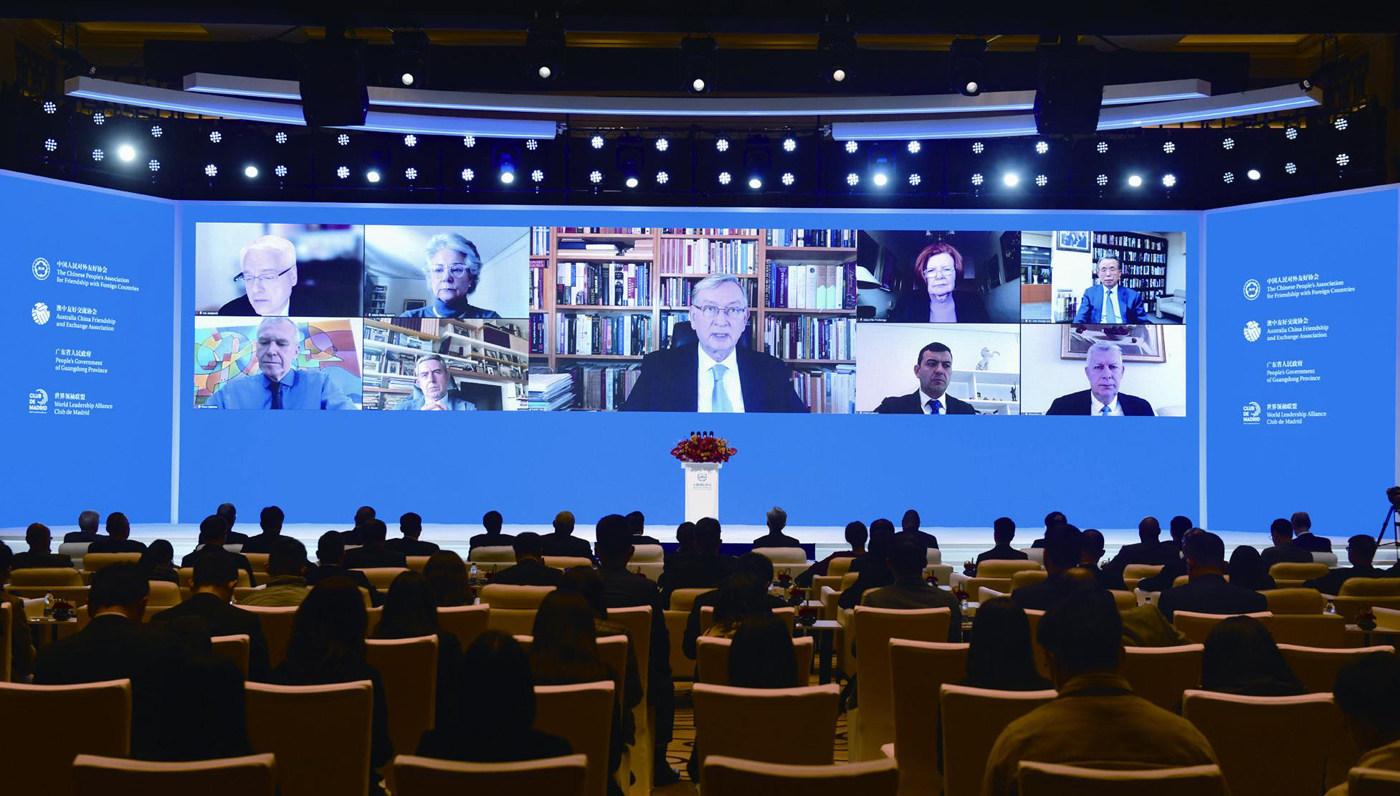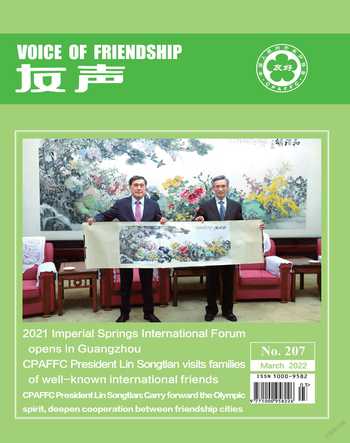Forum offers suggestions on multilateralism and global cooperation
Liu Lisha
O n Dec 5 and 6, the 2021 Imperial Springs International Forum was successfully held in Guangzhou, Guangdong province, co-hosted by the Chinese People’s Association for Friendship with Foreign Countries, the Australia China Friendship and Exchange Association, the People’s Government of Guangdong Province and the World Leadership Alliance Club de Madrid.
President Xi Jinping addressed the opening ceremony of the forum via video in Beijing. Vice-President Wang Qishan attended the opening ceremony and gave a speech.
Forum participants discussed the theme of the forum — “Multilateralism 2.0: Global Cooperation in the PostPandemic Era” — and six sub-themes, focusing on “What’s wrong with the world, and what we can do about it”. They offered suggestions on global cooperation in the post-epidemic era and expressed hope of building consensus to that end.
On Unconventional Global Challenges and Responses, participants noted that the world is suffering from a mixture of conventional and unconventional challenges, saying that unconventional challenges such as poverty, climate change, cybersecurity, terrorism and the spread of diseases are posing serious threats to human survival and sustainable development. Only by working together can the international community overcome the difficulties, they said.
Kjell Magne Bondevik, former prime minister of Norway, said he fully agreed with President Xi’s point of view that mankind is experiencing multiple crises rarely seen. He said poverty is a major unconventional security threat facing mankind and that China has led by example in reducing poverty and contributed to the cause of poverty reduction in the world.
Roza Otunbayeva, former president of the Kyrgyz Republic, said,“President Xi’s speech has charted the course for the future of mankind. We should build a better global governance system to address crises such as public health and climate change.”
Alenka Suhadolnik, ambassador of Slovenia to China, said that in the face of unconventional challenges such as imbalances in global development, development in one country is meaningless if it leaves others to stay poor. The peaceful development of China has set an example for the world.
On the topic of Upholding Multilateralism and Reshaping the Global Governance System, participants agreed that the core values and basic principles of multilateralism should be upheld and the modernization and capacity of the global governance system should be advanced in light of changes in the world landscape and the need to address global challenges.
Ban Ki-moon, former secretarygeneral of the United Nations cited the two major challenges posed by climate change and COVID-19 as proof that the world needs multilateralism to ensure the healthy development of the global governance system. He said he was firmly convinced that the multilateral system led by the UN can help people better address current and future challenges.
Yukio Hatoyama, former prime minister of Japan, said the United States only has good relations with countries that are true to its values. This one-sided value diplomacy will only aggravate the confrontation between China and the US. To advance the multilateral system, people need to think about how to build an international community of mutual respect and understanding.
Ivo Josipovic, former president of Croatia, said, “The United Nations is the most important multilateral mechanism today. It plays an important role in promoting multilateralism. Currently, we need multilateralism in an unprecedented way and need the UN to play its role.”

On the theme of Economic and Social Development and Climate Change: Realizing the 2030 Agenda, participants agreed that the slow economic recovery, social inequality and climate change pose serious challenges to the world. The international community needs to work together to respond to the challenges and put the UN 2030 Agenda for Sustainable Development back on track.
Danilo Türk, former president of Slovenia and president of the World Leadership Alliance de Madrid, and Susana Malcorra, former minister of foreign affairs and worship of Argentina, said, “Progress on the UN 2030 Agenda for Sustainable Development has been slow. The COVID-19 pandemic has seriously affected the world’s economic and social development. The international community urgently needs to join hands to address climate change.”
He Yafei, former vice-minister of foreign affairs of China, mentioned that social development and climate change are closely linked. We need to reshape the global governance system with a new way of thinking, practice true multilateralism, promote democracy in international relations and define the path for future development, he said.
Rafael Dezcallar, ambassador of Spain to China, spoke highly of China’s commitment and responsibility in setting the “dual carbon” target and promoting green development. He believed that China will play a more important role in addressing climate change.
On Public Health and Global Cooperation, participants noted that COVID-19 has made the international community deeply aware of the closely linked destinies of all countries. More attention has been paid to health issues and the building of a public health system. It has highlighted the importance of building a community of public health for mankind.
M a rg a r e t C h a n , f o r m e r director general of the World Health Organization, said that COVID-19 poses a serious threat to people’s health. It has exposed weaknesses in global health cooperation. Man should live in harmony with nature. Countries should strengthen cooperation to address common challenges.
J e f f r e y S a c h s , s p e c i a l representative of the UN secretarygeneral of sustainable development goals, and Moin Ul Haque, ambassador of Pakistan to China, spoke highly of China’s achievement in epidemic prevention and control and appreciated its valuable contribution to international cooperation against the pandemic. They stressed that no country can fight the pandemic alone and only by solidarity and cooperation can the virus be defeated.
Laura Chinchilla, former president of Costa Rica, said, “We should establish international alliances and sign global agreements to effectively deal with global risks and enhance coordination and cooperation among the international community.”
On Responsibility and Action of Leaders and the World Future, participants agreed that global threats call for global solutions. Leaders of all countries should bear the world in mind, make rational and prudent decisions, strengthen cooperation and create a bright future for mankind.
“It is not advisable to pursue unilateralism under the pretext of national security. Leaders of all countries should be more transparent and rational in their decision-making. It is unwise for the US to divide the world into democracies and non-democracies and engage in so-called decoupling,” said Nicholas Whitlam, chairman of Whitlam & Co and the son of Gough Whitlam, former prime minister of Australia.
Neil Bush, chair of the George H.W. Bush Foundation for US-China Relations and third son of former US President George H.W. Bush, said, “An important way to promote multilateralism is to strengthen exchanges. Only in this way can we enhance mutual trust. It is hoped that leaders of all countries will deepen communication and dialogue in various fields and actively promote people-topeople exchanges.”
Susan M. Elliott, president of the National Committee on American Foreign Policy, said the committee will spare no effort to build a channel of dialogue and cooperation between China and the US. She also called on the participants in the political field to bring the spirit of the forum back to their countries and incorporate it into their decision-making processes.
On Post-Pandemic Economic Recovery and Revitalizing Globalization, participants had a heated discussion and agreed that all countries should uphold true multilateralism, adhere to the concept of sustainable development and jointly tackle the difficult problems of economic recovery.
Zlatko Lagumdzija, former prime minister of Bosnia and Herzegovina, agreed with President Xi’s vision of people-centered development. He commended China for ensuring that the fruits of development are shared by all its people, saying that its development has made valuable contributions to addressing climate change and promoting sustainable development.
Rosen Plevneliev, former president of the Republic of Bulgaria, said that the G20 plays an important role in helping the world overcome crisis and promoting economic growth. To revive the global economy, more attention should be given to the strength of developing countries represented by China.
Yves Leterme, former prime minister of Belgium, said that improving the environment for investment and business will help countries enhance their economic resilience. The European Union can learn from China in this regard, he said.
The closing ceremony of the forum was held on the evening of Dec 6. Danilo Türk, former president of Slovenia and president of the World Leadership Alliance de Madrid, and Vaira Vike-Freiberga, former president of Latvia, former president of the World Leadership Alliance de Madrid and cochair of Nizami Ganjavi International Center, attended the activity online and delivered speeches. He Yafei, former vice-minister of foreign affair in China, made wrap-up remarks and read out the 2021 Imperial Springs Statement. Jiang Jiang, vice-president of the CPAFFC, Lin Ji, deputy secretarygeneral of Guangdong Provincial People’s Government, and Chau Chak Wing, president of the Australia China Friendship and Exchange Association and chair of the Asia-Pacific Region of World Leadership Alliance de Madrid, addressed the closing ceremony.
The 2021 Imperial Springs International Forum was a great success.
- Voice Of Friendship的其它文章
- CPAFFC Vice-President Jiang Jiang delivers a video speech for the exchange activity between Heilongjiang province and its international friendship cities
- Fred Engst:Memories of my father and mother
- Strengthen cooperation and exchanges for mutual benefit and win-win achievement
- “Protecting Our Common Home”Chinese, New Zealand teenagers watch birds in Poyang Lake on internet
- Valuable exchanges between Xi’an and foreign sister cities in pandemic
- Winning speeches of the 39th Chinese Speech Contest of All Japan

